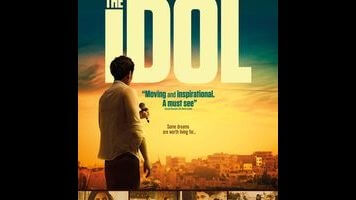Another major problem is that the movie spends nearly half of its running time on Assaf’s childhood, when a brief prologue would have sufficed. Indeed, if you didn’t know its subject going in, you’d likely assume, during those initial 40 minutes, that The Idol is about Assaf’s sister, Nour (Hiba Attalah), who’s more vital and ambitious than he is (at least as he’s played, at age 10, by Kais Atallah). After forming a band with two friends, these pint-sized musicians succeed in scoring a few wedding gigs near their home in the Gaza Strip, but Nour has much bigger plans in mind. When one of her kidneys suddenly fails, however, Mohammed is left to fulfill that dream alone, at which point The Idol finally leaps ahead a decade (and the role is taken over by Tawfeek Barhom). Can Assaf cross into Egypt for the Arab Idol audition, despite the interference of a former bandmate (Ahmed Al Rokh) who’s now a religious zealot and works for border patrol? Even if he can, what is he to do when he arrives and discovers that all of the slots for this year are full?
The real-life answers to these questions might have been engineered by Syd Field or Robert McKee, and play a tad cheesy on screen. But at least they involve the actor playing Assaf, who all but disappears once The Idol arrives at its competition. Abu-Assad goes even further than One Chance—the recent film in which James Corden played Britain’s Got Talent winner Paul Potts—in his use of actual TV footage, to the point where 95 percent of Assaf’s performances show him from a great distance (this is presumably the real Assaf) or focus on the audience’s and judges’ reaction, with only very occasional, glaringly incongruous close-ups of Barhom lip-syncing. At the very end, Assaf himself (who’s much more matinee-idol handsome than Barhom) actually steps in for the actor and assumes his own role. That’s refreshingly postmodern, at least, but it mostly just raises the question of why they bothered to fictionalize the story at all.
Ultimately, Abu-Assad seems much more interested in Assaf’s cultural significance than in the man himself or his magnificent voice, filtering what would normally be an individual’s quest for excellence through the lens of the Palestinian struggle. That’s a perfectly legitimate approach, but it needed either a documentary treatment or a gift for nuance and subtlety that Abu-Assad, for all the plaudits his films receive, has yet to demonstrate. When Assaf tells his mom that he’s nervous about the finals, for example, her reply is hilariously blunt: “There is nothing harder than being a refugee in Gaza living under siege. You can do it, son.” That’s a bumper sticker, not a line of dialogue, and it’s typical of The Idol’s ham-handedness. There’s a fascinating story here, but the movie never gets out of its own way long enough to tell it.

